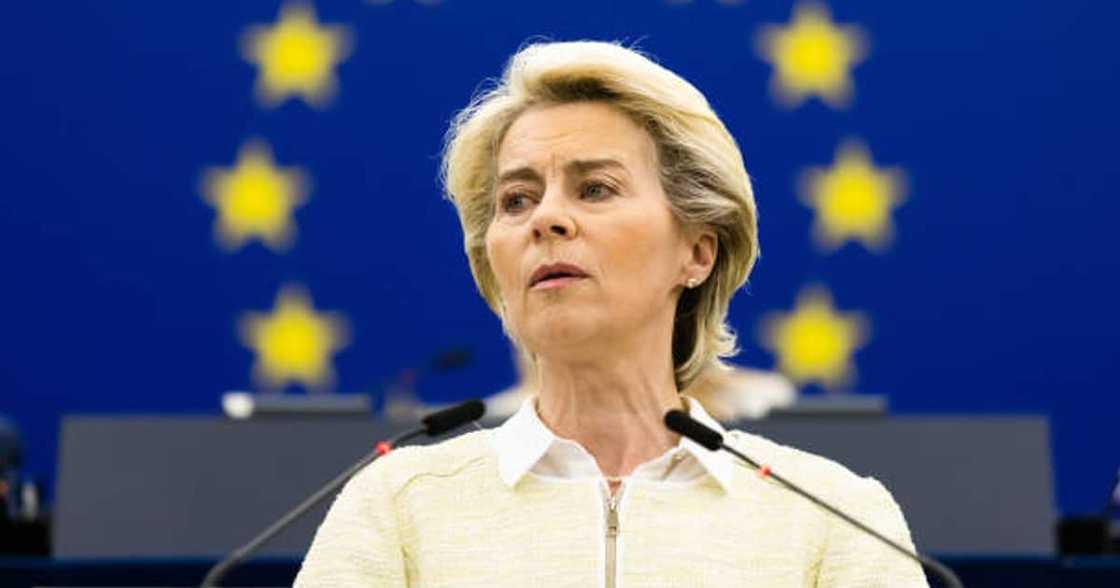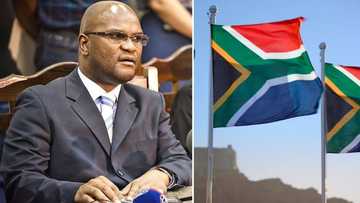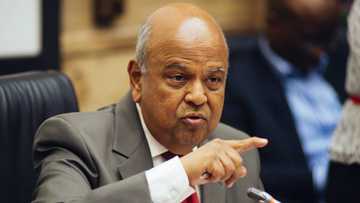“It Won’t Be Easy”: European Union Proposes Ban on Russian Oil, Hints That Tougher Times Are to Come
- The European Union (EU) proposed a ban on Russian oil in the new sanctions against the Kremlin
- The sanction proposed a six-month face out period for most EU nations as they adjust the commodity market
- But the European Commission President Ursula von der Leyen warned things will be tough for the bloc and its bilateral partners
PAY ATTENTION: Click “See First” under the “Following” tab to see Briefly News on your News Feed!
The European Union (EU) has proposed a ban on Russian oil in a fresh round of sanctions against the Kremlin.

Source: UGC
Russia was sanctioned by the union following her invasion of neighbouring Ukraine on February 24, 2022.
According to the European Commission President Ursula von der Leyen, the EU nations have been allowed a six-month face out period as they adjust the commodity market.
Leyen said on Wednesday, May 4 that Russia's push to wage war on Ukraine and evidence of war crimes informed the decision by the EU in taking bolder steps on energy sanctions.

Read also
Waste of taxpayers’ money: EFF slams R22m monumental flag project, tells Nathi Mthethwa to review use of funds
PAY ATTENTION: Never miss breaking news – join Briefly News' Telegram channel!
Tough times
However, she warned that the move will not be easy for the bloc and its partners around the world.
“Let us be clear: it will not be easy. Some member states are strongly dependent on Russian oil. But we simply have to work on it. We now propose a ban on Russian oil. This will be a complete import ban on all Russian oil, seaborne and pipeline, crude and refined," said Leyen.
She categorically stated that the face out period will allow EU member states to minimise collateral damage and maintain a stable economy.
“We maximize pressure on Russia, while at the same time minimizing collateral damage to us and our partners around the globe. Because to help Ukraine, our own economy has to remain strong,” he said.
Russia's war on Ukraine brought fresh economic concerns for the EU and its bilateral partners around the world, just two years after dealing with the COVID-19 pandemic.

Read also
John Steenhuisen pressuring ANC to align with Ukraine following his fact finding trip to the war torn country
The region depends on Russia for several sources of energy, and according to CNBC, Russian oil imports accounted for about 25% of the bloc’s crude purchases.
Implications
The ban on all Russian oil, seaborne and pipeline, crude and refined implies that the bloc's economy could be negatively impacted.
In March 2022, fuel prices soared and raised global inflation following sanctions imposed by nations on Russia.
Energy price shocks war to last for years
The World Bank warned that the food and energy price shocks from the Ukraine war could last for years.
In the latest Commodity Markets Outlook report released on April 26, World Bank noted that the war dealt a major shock to commodity markets, altering global patterns of trade, production, and consumption and this could keep prices at historically high levels through the end of 2024.
High inflation
In Kenya, the high fuel prices and food prices could increase inflation to between 5.8% and 6.2%.
“With fuel being a major contributor to Kenya's headline inflation, we expect the increasing fuel prices to continue exerting upward pressure on the inflation basket,” read Cytonn Investments April 2022 report in part.

Read also
Public Enterprises Minister Pravin Gordhan suggests a ban on the sale of scrap metal to preserve infrastructure
Russia is set to keep gas pipelines closed and demands that Poland and Bulgaria pays for fuel in Rubbles
In a related story, Briefly News also reported Russia is seeming using the country’s gas as blackmail after Gazprom PJSC ceased gas flow to Poland and Bulgaria until the countries agree to its demand to pay for the fuel in rubles.
Gas prices in Europe increased by more than 20% on Wednesday 27 April. The European Union has opposed Russia’s President Vladimir Putin’s decision however, payment deadlines are beginning to close in.
A possible compromise was supposedly on the horizon last week to allow gas to flow, however, European Union members Poland and Bulgaria have made it unattainable. Germany is also dependent on Russian gas and the country could soon start rationing its fuel supply, TimesLIVE reported.
Source: Briefly News

Kelly Lippke (Senior Editor) Kelly Lippke is a copy editor/proofreader who started her career at the Northern-Natal Courier with a BA in Communication Science/Psychology (Unisa, 2007). Kelly has worked for several Caxton publications, including the Highway Mail and Northglen News. Kelly’s unique editing perspective stems from an additional major in Linguistics. Kelly joined Briefly News in 2018 and she has 16 years of experience. Kelly has also passed a set of trainings by Google News Initiative. You can reach her at kelly.lippke@briefly.co.za.

Bianca Lalbahadur Bianca Lalbahadur is a current affairs journalist at Briefly News. With a knack for writing hard-hitting content, she is dedicated to being the eyes and ears of South Africans. As a young and vibrant journalist, Bianca is passionate about providing quality and factual stories that impact citizens. She graduated from the Independent Institute of Education in 2017 and has worked at several award-winning Caxton associated community newspapers.
